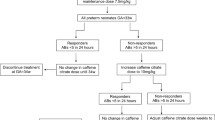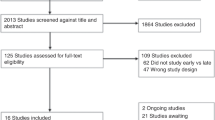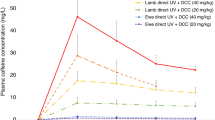Abstract
Objective:
Administration of caffeine citrate (caffeine) has been a central component of the treatment of apnea of prematurity. However, given its multiple pharmacologic effects, caffeine might be expected to produce hemodynamic changes in heart rate, stroke volume, cardiac output and vascular resistance.
Study Design:
In this prospective observational study, we report the hemodynamic effects of intravenous caffeine administration in a population of premature infants who received caffeine to correct or prevent apnea of prematurity.
Methods:
Hemodynamic effects of caffeine were determined in 31 infants. Stroke volume was measured via echocardiogram, using velocity time integral at the aortic root diameter. Statistically univariate analyses were performed parametrically using paired t-test and nonparametrically (sign test). Multivariate linear regression models were used to identify subgroup covariate effects.
Results:
After intravenous caffeine, cardiac index increased in 31 of 31 trials, by an average of 14.6±16.3% (s.d.); stroke volume increased in 24 of 31 trials, by 7.8±12.2%; heart rate increased in 28 of 31 trials by 7.7±7.2 beats per min; and blood pressure increased in 25 of 31 trials, by 4.1±5.8 mm Hg (all P<0.001). Multivariate linear regression revealed no significant effect of dose, birth weight, gestational age or postnatal age.
Conclusions:
Intravenous caffeine consistently increases cardiac output and blood pressure in relatively stable premature infants, when given to treat or prevent apnea of prematurity. We speculate that there may be a role for caffeine in the hemodynamic treatment of hypotensive/hypoperfused infants.
This is a preview of subscription content, access via your institution
Access options
Subscribe to this journal
Receive 12 print issues and online access
$259.00 per year
only $21.58 per issue
Buy this article
- Purchase on Springer Link
- Instant access to full article PDF
Prices may be subject to local taxes which are calculated during checkout

Similar content being viewed by others
References
Schmidt B, Roberts RS, Davis P, Doyle LW, Barrington KJ, Ohlsson A, et al. Caffeine for apnea of Prematurity Trial Group. Caffeine therapy for apnea of prematurity. N Engl J Med 2006;354 (20):2112–2121.
Aranda JV, Gorman W, Bergsteinsson H, Gunn T . Efficacy of caffeine in treatment of apnea in the low-birth-weight infant. J Pediatr 1977;90 (3):467–472.
Murat I, Moriette G, Blin MC, Couchard M, Flouvat B, De Gamarra E, et al. The efficacy of caffeine in the treatment of recurrent idiopathic apnea in premature infants. J Pediatr 1981;99 (6):984–989.
Hoecker C, Nelle M, Beedgen B, Rengelshausen J, Linderkamp O . Effects of a divided high loading dose of caffeine on circulatory variables in preterm infants. Arch Dis Child Fetal Neonatal Ed 2006;91 (1):F61–F64.
Walther FJ, Sims ME, Siassi B, Wu PY . Cardiac output changes secondary to theophylline therapy in preterm infants. J Pediatr 1986;109 (5):874–876.
Hoecker C, Nelle M, Poeschl J, Beedgen B, Linderkamp O . Caffeine impairs cerebral and intestinal blood flow velocity in preterm infants. Pediatrics 2002;109 (5):784–787.
Walther FJ, Erickson R, Sims ME . Cardiovascular effects of caffeine therapy in preterm infants. Am J Dis Child 1990;144 (10):1164–1166.
Fesslová V, Caccamo ML, Salice P, Marimi A . Assessment of cardiovascular effects to theophylline in premature newborns by means of serial echocardiography. Acta Paediatr Scand 1984;73 (3):404–405.
Noori S, Friedlich P, Wong P, Ebrahimi M, Siassi B, Seri I . Hemodynamic changes after low-dosage hydrocortisone administration in vasopressor-treated preterm and term neonates. Pediatrics 2006;118 (4):1456–1466.
Clark SJ, Yoxall CW, Subhedar NV . Right ventricular performance in hypotensive preterm neonates treated with dopamine. Pediatr Cardiol 2002;23 (2):167–170.
Zhang J, Penny DJ, Kim NS, Yu VY, Smolich JJ . Mechanisms of blood pressure increase induced by dopamine in hypotensive preterm neonates. Arch Dis Child Fetal Neonatal Ed 1999;81 (2):F99–F104.
Osborn D, Evans N, Kluckow M . Randomized trial of dobutamine versus dopamine in preterm infants with low systemic blood flow. J Pediatr 2002;140 (2):183–191.
Roze JC, Tohier C, Maingueneau C, Lefevre M, Mouzard A . Response to dobutamine and dopamine in the hypotensive very preterm infant. Arch Dis Child 1993;69 (1 Spec No):59–63.
Osborn DA, Evans N, Kluckow M . Left ventricular contractility in extremely premature infants in the first day and response to inotropes. Pediatr Res 2007;61 (3):335–340.
Lundstrom K, Pryds O, Greisen G . The haemodynamic effects of dopamine and volume expansion in sick preterm infants. Early Hum Dev 2000;57 (2):157–163.
Paradisis M, Evans N, Kluckow M, Osborn D, McLachlan AJ . Pilot study of milrinone for low systemic blood flow in very preterm infants. J Pediatr 2006;148 (3):306–313.
Author information
Authors and Affiliations
Corresponding author
Rights and permissions
About this article
Cite this article
Soloveychik, V., Bin-Nun, A., Ionchev, A. et al. Acute hemodynamic effects of caffeine administration in premature infants. J Perinatol 29, 205–208 (2009). https://doi.org/10.1038/jp.2008.193
Received:
Revised:
Accepted:
Published:
Issue Date:
DOI: https://doi.org/10.1038/jp.2008.193
Keywords
This article is cited by
-
Optimizing respiratory management in preterm infants: a review of adjuvant pharmacotherapies
Journal of Perinatology (2021)
-
A pilot randomized trial of high-dose caffeine therapy in preterm infants
Pediatric Research (2015)
-
High versus low-dose caffeine for apnea of prematurity: a randomized controlled trial
European Journal of Pediatrics (2015)
-
A modified single-walled carbon nanotubes/carbon-ceramic electrode for simultaneous voltammetric determination of paracetamol and caffeine
Journal of the Iranian Chemical Society (2014)
-
Early caffeine therapy and clinical outcomes in extremely preterm infants
Journal of Perinatology (2013)



